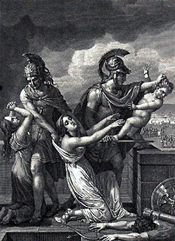
10 Feb 2008
MARTÍN Y SOLER: Andromaca
Andromaca: Dramma per musica in three acts.
Mozart and Salieri, an opera in one act consisting of two scenes.
Nicolai Rimsky-Korsakov (1844-1908), composer. Libretto derived from Alexander Puskhin's play of the same name.
First performance: 7 December 1898 in Moscow.
Ariadne auf Naxos, Oper with a prologue and one act. Music composed by Richard Strauss. Libretto by Hugo von Hofmannsthal.
La Vestale, a tragédie lyrique in three acts.
Boris Godunov, an opera in four acts with prologue
Modest Mussorgsky, composer. Libretto by the composer, based on Alexander Pushkin's drama Boris Godunov and Nikolai Karamazin's History of the Russian Empire
First performance: 8 February 1874 at the Mariinsky Theatre, St. Petersburg
Il Trovatore, dramma in four parts.
Only a few months following the premiere of Der Rosenkavalier, Hugo von Hofmannsthal proposed a new opera to Richard Strauss based on Molière’s comedy-ballet, Le Bourgeois gentilhomme (in German, Der Bürger als Edelmann).
Die Entführung aus dem Serail, Singspiel in 3 Acts.
Music composed by Wolfgang Amadeus Mozart (1756–1791). Libretto by Johann Gottlieb Stephanie the Younger, based on an earlier libretto by
Christoph Friedrich Bretzner.
Die Entführung aus dem Serail, Singspiel in 3 Acts.
Music composed by Wolfgang Amadeus Mozart (1756–1791). Libretto by Johann Gottlieb Stephanie the Younger, based on an earlier libretto by
Christoph Friedrich Bretzner.
Arabella: Lyrische Komödie in three acts
Die Entführung aus dem Serail, Singspiel in 3 Acts.
Music composed by Wolfgang Amadeus Mozart (1756–1791). Libretto by Johann Gottlieb Stephanie the Younger, based on an earlier libretto by
Christoph Friedrich Bretzner.
La Gioconda, dramma lirico in four acts.
Music composed by Amilcare Ponchielli (1834–1886). Libretto by Arrigo Boito (under the pseudonym Tobia Gorrio), based upon Victor Hugo's Angelo, Tyrant of Padua (1835).
Don Carlo, an opera in four acts. Music composed by Giuseppe Verdi (1813–1901). Libretto by Joseph Méry and Camille Du Locle after Friedrich von Schiller’s dramatic poem Don Carlos, Infant von Spanien. Revised version in four acts (French text revised by Du Locle, Italian translation by Achille de Lauzières and Angelo Zanardini).
Un ballo in maschera, a melodramma in three acts.
Music composed by Giuseppe Verdi. Libretto by Antonio Somma, based upon the work of Eugène Scribe Gustave III ou Le bal masqué (1833)
Medea: Melodramma tragico in three acts.
Die Tote Stadt, an opera in three acts.
Music composed by Erich Wolfgang Korngold (1897-1957). Libretto by Paul Schott (Julius and E. W. Korngold) after the novel Bruges la morte by Georges Rodenbach.
Some Details concerning the Revolution inaugurated by Rossini
Manon Lescaut, dramma lirico in quattro atti
Elektra: Tragedy in one act.
Lyric Opera of Chicago has announced both schedules and cast-lists for is Spring 2020 performances of Richard Wagner’s Ring Cycle. Given the series of individual productions already staged by the company since Fall 2016, that pave the way for the complete cycle, Lyric Opera of Chicago’s complete production should affirm the artistic might of the great composer.
“Diacono himself does not know what musical talent he possesses” – Mascagni

Andromaca: Dramma per musica in three acts.
Streaming Audio
Music composed by Vicente Martín y Soler. Libretto adapted from Andromaca by Apostolo Zeno and Andromaque by Jean Racine.
First Performance: 26 December 1780, Teatro Regio di Torino, Turin
| Zeno’s [Racine’s] Principal Characters: |
| Pirro [Pyrrhus], son of Achille, King of Epirus (Ipiros) and lover of Andromaca |
| Andromaca [Andromaque], widow of Ettore, Trojan princess and slave of Pirro |
| Astianatte [Astyanax], adolescent son of Andromaca |
| Telemaco, adolescent son of Ulisse raised by Andromaca under the name of Astianatte |
| Ulisse, King of Itaca and Greek ambassador |
| Ermione [Hermione], daughter of Melelao (King of Sparta) and Helen, promised to Pirro and lover of Oreste |
| Eleno, prince of the royal Trojan blood and secret lover of Andromaca |
| Oreste [Orestes], son of Agamennone (King of Argo) and lover of Ermione |
| Eumeo [Phoenix?], tutor of Telemaco and confidante of Ulisse |
| [Pylade], friend of Oreste |
| [Cléone], confidante of Ermione |
Setting: Troy after its fall to the Greeks
Introduction:
According to the Argomento to his libretto, Zeno explained that this work is as amalgam of Andromaca of Euripides and Racine and of the Troadis (Troades (The Trojan Women)) by Euripides and Seneca. Although none of the characters are of his own invention, Zeno asserts that he has woven them together in an authentic manner.
Synopsis:
At the end of the Trojan war Andromaca [Andromaque], Ettore’s [Hector’s] faithful widow, her son Astianatte [Astyanax] and his ‘brother’ Telemaco [Telemachus in The Odyssey], Ulisse’s [Ulysses’] child, whom she had abducted and raised as her own, are held captive by Pirro [Pyrrhus] (soprano), King of Epirus, who desires Andromaca although she rejects his love. She fears for the life of Astianatte, whom the Greeks regard as heir to Ettore’s strength. The Spartan princess Ermione [Hermione], betrothed to Pirro [Pyrrhus], is overcome with jealousy at her lover’s betrayal, and wants to eliminate her rival. Ulisse [Ulysses (or Odysseus)] comes to press Pirro into honouring his commitment to Ermione, to punish Andromaca for the abduction and murder (he thinks) of his son, and to kill Astianatte. Protected by Pirro, Andromaca hides the boys in Ettore’s tomb. When Ulisse discovers them, she reveals that one of them is his son. After Ermione identifies Telemaco, and Astianatte is taken to be executed, Pirro commands that Telemaco too must die. Ulisse then relents and their lives are spared. Pirro, hearing that Andromaca would kill herself if forced to be his wife, accepts Ermione.
Click here for Zeno’s complete libretto.
Many thanks to Carlo Vitali for his helpful comments.